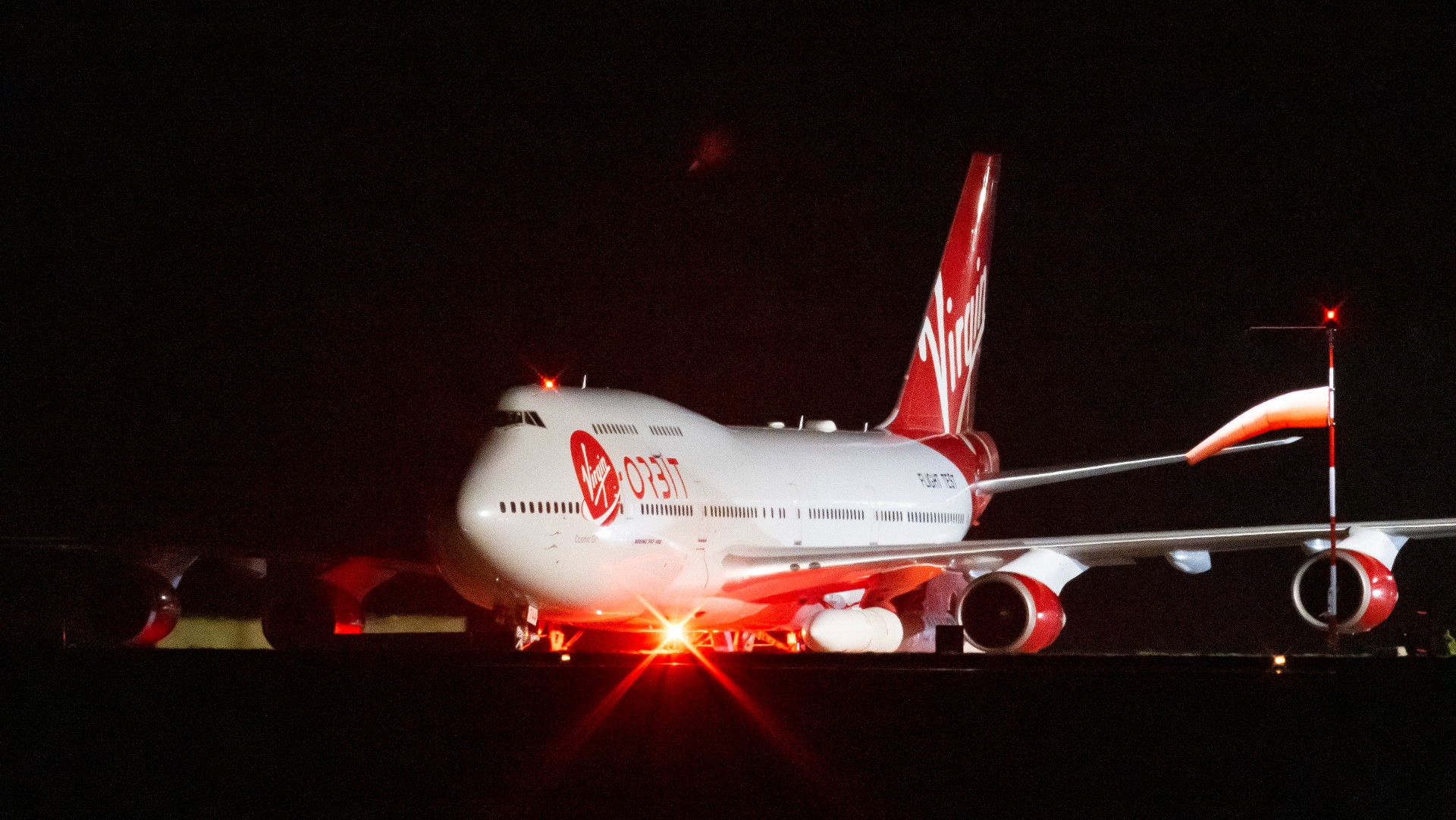Historic Cornwall satellite launch ends in failure
The Virgin Orbit mission was the first attempt to launch satellites into space from British soil

A free daily email with the biggest news stories of the day – and the best features from TheWeek.com
You are now subscribed
Your newsletter sign-up was successful
The UK’s burgeoning space industry suffered a significant setback last night after the launch of the Virgin Orbit rocket ended in failure.
The LauncherOne rocket experienced an “anomaly” during its “horizontal launch” mission and failed to reach orbit. Carried under the wing of a modified Boeing 747 aircraft known as Cosmic Girl, it took off from the Cornish coastal town of Newquay and was subsequently released over the Atlantic Ocean.
Commenting after the initial lift-off, Virgin founder Richard Branson said of the company’s “Start Me Up” mission: “Like the song says once we start it up we’ll never stop.”
The Week
Escape your echo chamber. Get the facts behind the news, plus analysis from multiple perspectives.

Sign up for The Week's Free Newsletters
From our morning news briefing to a weekly Good News Newsletter, get the best of The Week delivered directly to your inbox.
From our morning news briefing to a weekly Good News Newsletter, get the best of The Week delivered directly to your inbox.
But “within less than two hours, the mission ground to a halt, when the rocket failed to reach the orbit needed to deploy its cargo of nine satellites”, said The Telegraph.
It was part of an ambitious attempt for the UK to become the first European nation to launch a satellite into space and had it been successful would have marked a “major milestone” for the fledgling UK space industry, said the BBC.
The converted 747, Cosmic Girl, took off to “whoops and cheers” from a crowd who had gathered at Spaceport Cornwall to watch the launch last night, said The Guardian, but the excitement soon turned to disappointment.
The LauncherOne rocket, and the nine satellites it was carrying, have been lost and are expected to break up safely over the North Atlantic, while the 747 returned to its Cornwall base.
A free daily email with the biggest news stories of the day – and the best features from TheWeek.com
Matt Archer, the director of commercial spaceflight at the UK Space Agency, said that it was not known what caused the “anomaly” that resulted in the rocket failing to reach orbit, but said that “a lot of positives have been achieved”, including a successful launch.
“Space is hard. We knew that this had a risk of failure. Launches don’t always work. We’ve created the conditions for launch here. We’ve shown we can do it and we’ll look to do it again,” he added.
It comes amid a series of European setbacks in the past year, said Reuters. The European Space Agency’s Ariane 6 launcher has been delayed, access to Russian Soyuz rockets is blocked by the Ukraine war and the Italian-built Vega-C rocket has been grounded.
Sorcha Bradley is a writer at The Week and a regular on “The Week Unwrapped” podcast. She worked at The Week magazine for a year and a half before taking up her current role with the digital team, where she mostly covers UK current affairs and politics. Before joining The Week, Sorcha worked at slow-news start-up Tortoise Media. She has also written for Sky News, The Sunday Times, the London Evening Standard and Grazia magazine, among other publications. She has a master’s in newspaper journalism from City, University of London, where she specialised in political journalism.
-
 Will increasing tensions with Iran boil over into war?
Will increasing tensions with Iran boil over into war?Today’s Big Question President Donald Trump has recently been threatening the country
-
 Corruption: The spy sheikh and the president
Corruption: The spy sheikh and the presidentFeature Trump is at the center of another scandal
-
 Putin’s shadow war
Putin’s shadow warFeature The Kremlin is waging a campaign of sabotage and subversion against Ukraine’s allies in the West
-
 Nasa’s new dark matter map
Nasa’s new dark matter mapUnder the Radar High-resolution images may help scientists understand the ‘gravitational scaffolding into which everything else falls and is built into galaxies’
-
 Moon dust has earthly elements thanks to a magnetic bridge
Moon dust has earthly elements thanks to a magnetic bridgeUnder the radar The substances could help supply a lunar base
-
 How Mars influences Earth’s climate
How Mars influences Earth’s climateThe explainer A pull in the right direction
-
 The ‘eclipse of the century’ is coming in 2027
The ‘eclipse of the century’ is coming in 2027Under the radar It will last for over 6 minutes
-
 NASA discovered ‘resilient’ microbes in its cleanrooms
NASA discovered ‘resilient’ microbes in its cleanroomsUnder the radar The bacteria could contaminate space
-
 Artemis II: back to the Moon
Artemis II: back to the MoonThe Explainer Four astronauts will soon be blasting off into deep space – the first to do so in half a century
-
 The mysterious origin of a lemon-shaped exoplanet
The mysterious origin of a lemon-shaped exoplanetUnder the radar It may be made from a former star
-
 The 5 biggest astronomy stories of 2025
The 5 biggest astronomy stories of 2025In the spotlight From moons, to comets, to pop stars in orbit